Text
I found your focus on goals and how the shown extreme capitalistic society posed a counterforce to their goals. While I see our society's capitalism as an opportunity to reach our goals, this dystopian world places capitalism as a constant threat to what most of us hold most valuable, our lives.
Cyberpunk Edgerunners (Episodes 1,2,6,10)
Love this one. I watch all 10 episodes last year. So, I just watch 1, 2, 6 and 10 this time. Final week is hard. I love cyberpunk topic, and I've seen tons of movies and novels about it. So even though I'm not a big fan of the big fight scenes, I still love this one.

Maine is like the example for David. I have to say, not only David, but most people under this absolute capitalism society don’t have their dream or lose their dream gradually. For example, in episode 6, when Maine is mostly overwhelmed by the implants, he refuses to degrade his implants, because he's come so far, he can't go backwards. But making money, improving implants and programs should never be the end goal, but he got lost. Like Maine's inner racetrack, this is just a racetrack, there is no end, no goal, no other things. David is a little bit different, because he has a goal, although the goal is from his mother and Lucy. He just doesn't have his own goal. But anyway, their efforts still couldn't get past the capital controls, so eventually they failed. As Tanaka said, whether you realize it or not, you are living under the control of capitalism.
Lucy is the only person I know who has a dream of her own. As a person who was once controlled by Arasaka when she is little, her dream is to escape the control of capitalism and "fly to the moon". However, the Moon is also only a temporary escape which actually still controlled by capitalism. It's worth emphasizing that, based on edgerunner's generous pay, I think Lucy and David would have had enough money to go to the moon a long time ago, just because they were stuck on this path, like Maine, and couldn't get out. (I'm not sure if they have enough money, but David's house in Episode 9 is really luxurious, so I think they have enough money.)
Although the ending was heartbreaking and most of the characters died, I think it was reasonable. It's not a anime which good guy (main character) finally succeeds, but it's realistic. In a high-controlled capitalist society, David's failures, and those of the other characters, are reasonable. Overall, I love the Cyberpunk: Edgerunners, Lucy’s character is so successful. And I have to say, Rebecca's death was so sudden.
10 notes
·
View notes
Text
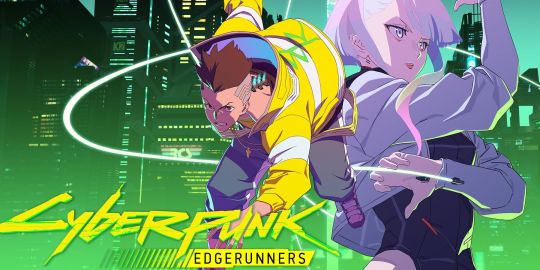
Cyberpunk Edgerunners
This is by far one of my favorite animes. After watching so much anime I got pretty numb to the portrayed unfortunate misgivings and character deaths. However, this anime got me on a another level. Death is pretty commonplace in this anime. However, I see it as beyond a simple character death. To start off, we can see a colossal class disparity. The mega-rich retain everything while everyone else (Not necessarily well of) is under severe pressure placing them into either alignment with the superrich, or extreme societal deviation. Regardless of such choice in alignment, corporate war and simply the “regular life” portrayed in Cyberpunk Edgerunners places everyone other than the mega rich as disposable. Death happens in mass regardless of affiliation and status if not the very top ring of the Corporate enterprise. The hopelessness of life in that society made each death seem like the deepest hole finding a way to grow itself even more.
The show places an interesting perspective on giant corporations' effects and risks. In a society rules by “for profit” interests, common human value is lacking, and people again are forced into the extremes of aligning with such Mega Corps or becoming a rebel. Regardless of the choice, a clear social standard is placed. Megacorps use rebels for their dirty work through intermediaries and overall play good and bad cop.
Another interesting viewpoint in how society alters due to the show’s cyberpunk characteristics. The increased military capabilities of individuals given by these machines make individuals retain significant power, whether physical or digital, and individuals may obtain such power enough to attempt to challenge the megacorps. Unfortunately, as we find in the last episode, it's not enough.
0 notes
Text
I also found the distortion of the perception of time and reality that the show presented really fascinating (and confusing). Although I thought that she died so I don't know how they got stolen.

Even though it was a class choice, this movie is by far my favorite we've seen so far! I LOVE LOVE LOVE thrillers and this was just the cherry on top. Perfect Blue seems like an interesting title to give to this movie and I found later that it could mean either metamorphosis or total pervert. Both of which are extremely prevalent in this film. I could not keep my eyes off Me-Mania, even though he was absolutely foul looking. I got goosebumps every time his presence was on screen and felt so bad that Mima had to deal with this stalker by herself. What I also found intriguing about this movie is the last 20 minutes where I could not tell whether Mina was in a dream or awake. And when she was awake, I couldn't tell if it was a scene being shot for the tv show or if it was truly reality. Then there is foreshadowing during the scene being filmed where Mima is diagnosed with dissociative identity disorder. The theme of identity comes into play here as Mima is constantly bullied by Idol Mima who is constantly dressed up as a pop idol and taunts her. Mima fights her own self as she wants Idol Mima to disappear so she can go back to being herself. At the end of the movie we find out that Rumi is the one who has D.I.D. and was responsible for the murders, the website, and communicating with Me-Mania. Rumi's split personality was Idol Mima who believed she was a pop idol, and the other personality of Rumi was Mima's friend and manager. We see how this struggle with self and identity proved to be harmful to not only herself but to others. When taking a closer look at the details of this movie, we see all along how it could have been Rumi. After the murder of the photographer, Rumi placed the bloody clothes in Mima's closet as well as stealing her Cham poster and fish. All of these tiny details are so important in piecing this epic plot together. Overall 10/10!
4 notes
·
View notes
Text
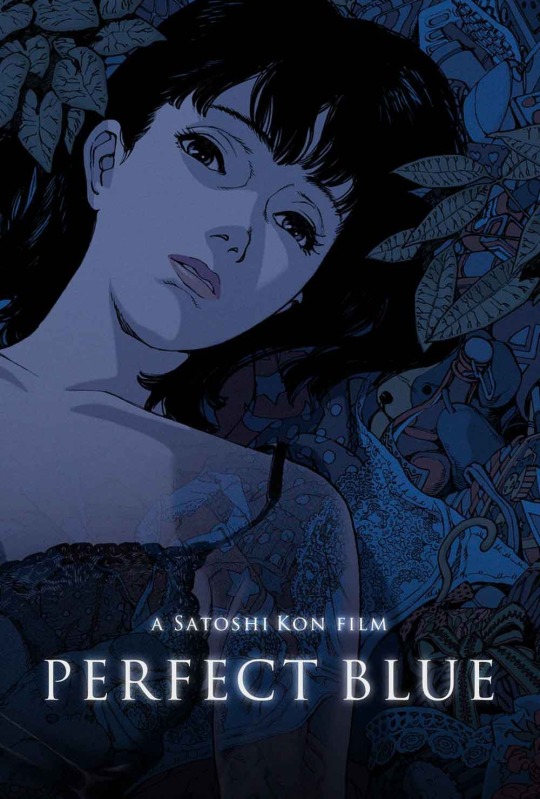
Perfect Blue
Ok, so, huh? What? “Is it real?” Good question because I don't know anymore. The show follows a line in which I am unsure of what is actually happening. Dream? Reality? The show explicitly questions its own passing of time when Mima Kirigoe tells Rumi that its been a while when its only been a day. Also, the portrayal of time overall makes the viewer's perception of time distorted to the point that, personally, made the show is quite incomprehensible. I had no way of telling what was actually happening or not. No doubt that was part of the intent of the show design as can be observed through the constant use of perceived “rollbacks” (or real I am not even sure) that makes the reader question what on the show is “real” for Mima Kirigoe.
The shows focus on identity. There is an interesting conflict between who she “is” versus what she considers herself or chooses to be. Although with all honesty I don't understand how this conflict relates to the mirages of her evil J-pop idol persona (aka Rumi maybe?), it does illustrate this perception of identity in ways that I found particularly interesting. For example, the a great emphasis on career as the definition of one's identity. In Perfect Blue, the clash of identity is presented by changes in occupation. We have seen clashes between individual identities in this course, like Wolf Children, where their wolf and human identities clash. However, in the case of Wolf Children, the conflict of identity stemmed from an inherent and unchangeable characteristic of the characters. However, in Perfect Blue, the conflict is between a more fluid characteristic which is one’s career. I find it interesting that the clash between these changeable aspects of Mima Kirigoe led her to a much greater conflict than the inner conflict of the Wolf Children. Perhaps the show attempts to illustrate the importance of one’s career in one’s identity.
2 notes
·
View notes
Text
I was also questioning what I did watch. I think that caotic nature of the show is indeed assisted with the short 5 minute eps format. I didn't think of it while watching, but I also agree with your interpretation of the show depicting that international relations are complicated. However, I don't agree with your concerns for grounds for parody in this show. The distortion of the actual historical validity as a consequence of attempted humor to me completely invalidates the actual historical nature of the show to me. I find this series to be more of a completely new storyline, with overlap with actual history nothing more than very abstract concepts to the point that I cant even associate this anime to the actual occurrences of the war. So to me criticizing this anime for its downplay on the impacts and implications of the war through its remodeled humorous format is like judging oil and water the same for being a liquid.
4/9 - Hetalia: Axis Powers
I had heard of Hetalia prior to watching the assigned episodes for tonight, and after watching the episodes, I was definitely thinking to myself 'what on Earth did I just watch'? Although I didn't quite understand what was going on at times, I think I was able to catch on to enough to write about. I think that not only the plot but also the existence of Hetalia in the first place have applications to the real world.
If there was one thing that I were to take away from Hetalia, it is that history and international relations are complicated. Even in the more fictionalized elements of the episodes we watched, there was some kind of friction or confusion going on that made things much less smooth than they could be. I already know this to be the case, but it was interesting seeing this kind of strange spin on real events. I think the entire concept of the show itself calls into question what is and isn't grounds for parody - this show covers some topics that are not necessarily humorous and attempts to make them so. When some of the topics in question are actual wars that happened, it made me wonder about the ethics of parody (at least in this respect) and the making light of very heavy events.
Maybe things would make a little more sense if I were to complete the series, so maybe I'll have to make that happen. I definitely think that the format of the episodes (the 5 minute length, the multiple storylines within each episode, etc.) lent itself to a very chaotic and disjointed experience when compared to the movies and shows we've watched before in this class. I will welcome the more long-form format of Your Name when we watch that for Friday.
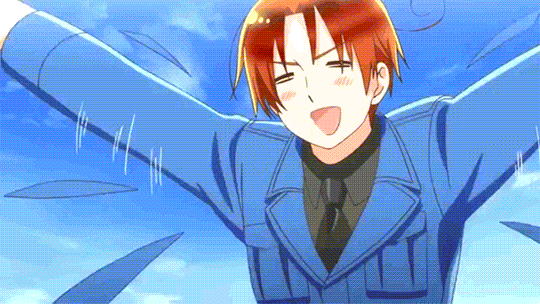
4 notes
·
View notes
Text
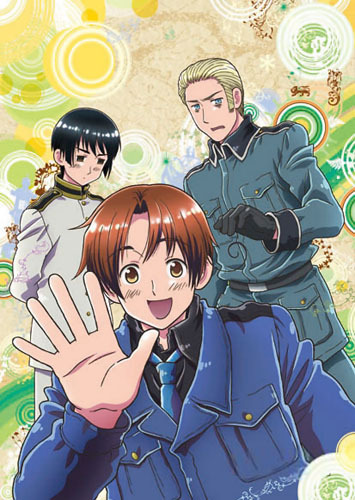
Hetalia Axis Powers’ eps 1-19
In Hetalia Axis Powers’ eps 1-19, the use of anthropomorphized nations to “reinact” historical events as human characters. Although its factual validity and historical accuracy are questionable, the show gives political commentary through humor.
Although I understand that the shows main focus on conveying humor, satire, and political commentary through the storytelling of the humanized nations as they navigate parts of history, I find their base of information too limited, generalized, and even assumed to be able to enjoy the show. The character's unique personalities and quirks, such as Germany being depicted as strict and serious, have as a source stereotypes and generalizations of the nations of people which I find quite humorous. However, in the anime attempt to then use these already generalized characters to try to simulate historical events in a humorous, or satiric way, all sense of historical accuracy flees from me. Watching this show then became a off branded tale of a story that never existed in the first place. It quite honestly felt pointless to watch, the “historically inspired” storyline would be best described as a remake of history.
However, I did find the series humor clever. Through its humorous approach, Hetalia provides a commentary on several political and cultural issues. The show's use of satire is particularly noteworthy, with the series often poking fun at the stereotypes and cultural differences between the different nation characters. While the humor can sometimes be silly and nonsensical — of which to me felt to be more on the nonsensical side — it adds a lighthearted touch to the heavy reality of the death and destruction that happened in the wars and other political conflicts.
1 note
·
View note
Text
Another big thing I noticed relating to unofficial culture capital is the economic aspect of it. While in most places you could really accumulate monetary value from such capital, these conferences create a space and the opportunity for creators to turn this unofficial culture capital into real income.
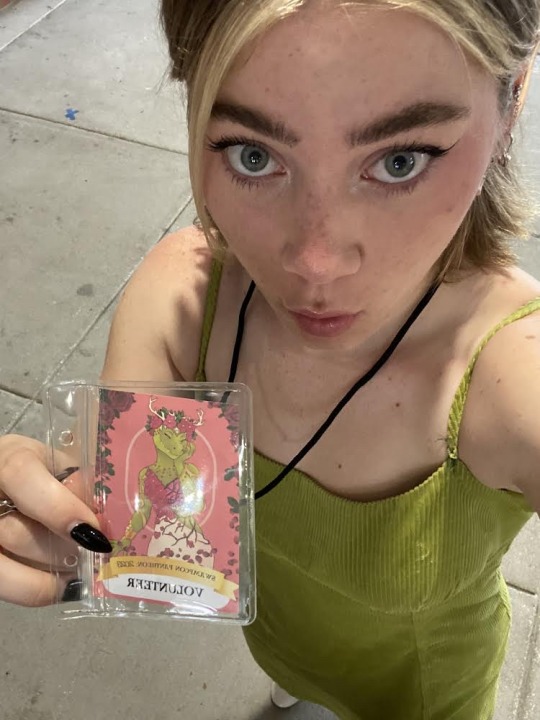
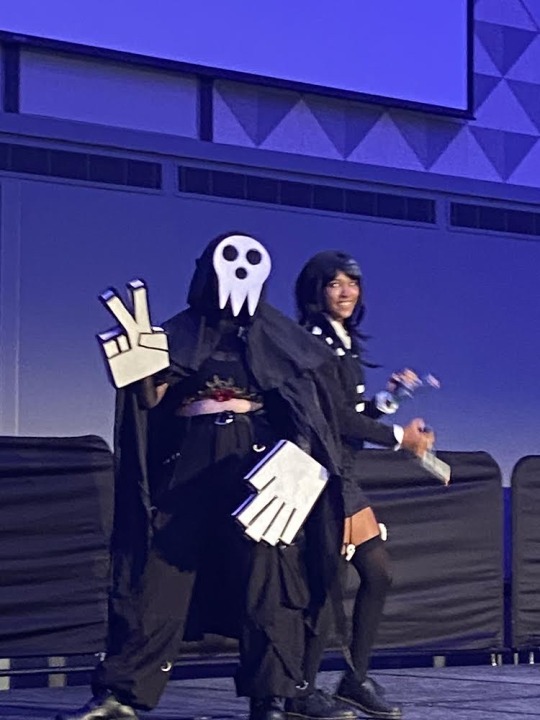

SWAMPCON 2023 <3
I want to start this blog post talking about my time at SwampCon 2023!! WOO! As a volunteer, I was scared that I was not going to be able to enjoy the convention like everyone else, but I was mistaken. I still got to enjoy the vendors, shows, and cosplays!
I loved walking around the Reitz and seeing so many people dressed up in their favorite characters. Everyone was so sweet and kind! I love the atmosphere that conventions bring. Just folk coming together to consume the things they love. Additionally, the vendors were awesome. You could buy fantastic works of art, jewelry, clothes, etc. from talented creators. There was one shop that sold the cutest earrings! XoX.
Anyway getting back on track, the drag show, cospoi show, and maid cafe were my favorite parts of the convention. Starting with the drag show, I just love how creative and fun the shows and outfits were! For example, one of the queens were dressed up as a game character and used a large mouse prop to imitate gameplay, which I thought was really cool. The cospoi show was so unlike anything that I have ever seen before; It was amazing! The music and the theatrics were beautiful and I would definitely attend again. I especially like the glowing balls that they swung with the music. Lastly (and most certainly not least), the maid cafe was so cute! You could order cakes and drinks while the maids performed a dance for the guests. The atmosphere was so chill. One more thing that I really enjoyed at the convention was the drum game they had in the U.R.G.E room. You would have to hit a drum to the beat of the music. My boyfriend and I had a blast in there.
If I could add something to the convention to make it better, it would be to add more decorations around the Reitz. If there weren’t so many people in cosplay, you would not be able to tell that there was a convention going on in the Reitz. It was plain. I wish there were more SwampCon decorations around the building.
I briefly talked about consumption above, and want to expand on that discussion. In class we talked about the unofficial/shadow culture capital, otaku, fandoms, etc. and I want to apply these concepts to my time at SwampCon. The convention allows fans ( in this case mostly fans of anime) to come together and personalize a piece of fictional anime. An example of this in its most simple form would have to be cosplay. Cosplay is an outward expression of a fan’s love for a certain piece of fiction, and allows them to ‘give love’ back to that show. Additionally, the vendors were also contributing to the otaku culture that accumulates at conventions such as at SwampCon. These artists create pieces of work that allow them to portray their view of a show however they see fit. For example, one amazing artist had artwork of two characters from Danganronpa kissing (which is awesome). In this manner, it is similar to doujinshi.
I want to also discuss the spread and use of unofficial culture capital at the convention. I went to the convention with my boyfriend and my friend Riley, who has not watched any anime. I was able to talk with other convention attendees about a show and spread shadow culture capital with them, but my friend Riley had a hard time since she hasn’t accumulated any unofficial culture capital about anime. After the convention, she was finally convinced to watch anime (WIN).
I enjoyed my weekend very much at the convention and will certainly be attending next year!
3 notes
·
View notes
Text
Swampcon
As a first-time attendee of conferences like the Swampcon in Rietz, I was fascinated by the distinct economy that surrounded the event's fan culture. At the conference we could clearly see the Otaku’s means of “possesing” the object of their desires by creating their own spinoffs through the many artists and creators present repurposing ideas from popular culture and niche material to produce their own unique narratives. Not only did these artists produce such content, but they were also selling it for wealth. It was also interesting to see how the attendees of the convention were avid consumers of this type of re-created content.
At the vendor booths, I had the chance to speak with one of the sellers who was showcasing his collection of quite well-crafted posters — where both the designs and even the material imprinted were of very high quality — based on popular anime series. I was surprised to learn that he was able to travel around the country selling his designs, and that he and his partner made money through the designing, drawing and selling of such recreations of existing content. It was interesting to see how he was able to make a living from such a niche fandom, and it made me realize that there are a significant number of opportunities to be found in targeting specific communities.
Swampcon was not just limited to anime enthusiasts, though. It also contained Furries, Star Wars fans, and "believers of the dark," among other niche groups. The vendors at the convention were similarly diverse, targeting specific fandoms and subcultures. I noticed markets ranging from goods of the occult to recreated anime. The prevalence of such a wide range of fandoms concentrated in such an environment makes me think if there is a possible link between these different niches. Maybe the specificity of these fandoms and their conceptual difference to “common” society makes them thrive in such small niche-focused events.
Another aspect of Swampcon that caught my attention was the emphasis on identity expression. The convention was a safe space for people to dress up and explore different aspects of their identity with lesser fears of judgment or ridicule. I saw numerous cosplayers, furries, and cross-dressers who didnt seemed too concerned in expressing themselves. These kinds of smaller fandoms seem to be more open minded. Perhaps its due to their differences from the “standard” of society, placing them in a position of being more accepting and welcoming of more uncommon means of identity expression.
To sum it up, attending Swampcon was a really cool experience that exposed me to the unique economy of fan culture. The convention showed me how niche markets can be a source of opportunity for artists and entrepreneurs, and how targeting specific subcultures can be an effective way to build a dedicated following and a consistent source of income. The diversity of identity expression at the convention was particularly striking, not only were there multiple different means of expression — particularly on the way one dressed — but their proportion relative to the number of people that attended the conference was incredibly high compared to my own personal expectation. Overall, I enjoyed my time at Swampcon and look forward to attending similar events in the future.
2 notes
·
View notes
Text
Despite his self deprecation and depression throughout the whole movie, in the end, he finds out that none of it mattered. the things he wished for and used as a justification for his self-hatred were not even what he wanted.
Neon Genesis Evangelion Tres

I am truly flabbergasted. I started the anime amused at the full minute of back-to-back production & company and ended with a whole lotta confusion and disgust.
STARTING with the opening scene. In part uno and dos of the Neon genesis evangelion trilogy I was trying to feel for Shinji. I knew that I wouldn’t understand one hundred percent since he’s a fourteen-year-old boy, but I tried to empathize with the outright toxic and damaging community he had around him and the effect on his mental health. But him exposing Asuka’s naked body as she lies unconscious in a HOSPITAL bed and masturbating to it,,, I was honestly speechless. To take advantage of someone in such a vulnerable state, and then spend most of the movie moping around and berating yourself… I couldn’t find any more empathy for him. AND the kicker is that Asuka KNEW and said he did it on multiple occasions. A REPEAT OFFENDER! Literally clutching my pearls I can’t anymore. Is this some sort of fanservice thing? Why do these creative minds decide to use their artistry to make such appalling material???
Then, when we get past that, [approximately] fifteen minutes later we see a THIRTY-year-old WOMAN kissing a FOURTEEN-year-old CHILD. I even googled the ages to confirm. From the past episodes, it seems as if they have a peculiar relationship going on. Nobody knows what a healthy relationship looks like in this show but Misato is kinda like a caretaker/ guardian to him. I saw this dynamic while she was trying to snap him out of his depressive state by encouraging him to make his own decision and pilot the robot. I guess as an extra boost of encouragement she kisses him and hints towards him getting “more” later. Fighting for my life to look past how wildly INAPPROPRIATE this is for the bigger picture, it seems as if the circumstances were unique. They were in a life or death type of scenario, and Shinji looked like he was ready for everything to just end (ex. Him not even lifting his head when that guy had a gun pointed at him). Misato acknowledges this and that she’s probably gonna die anyway, so she pulls this stunt as a last-ditch effort. Did it work? Shinji kinda just sat there staring at the robot for a good chunk of the movie so…

In the grand scheme of this, this movie showed the state of Shinji’s mental health, and how depression affected him greatly. He lost the will to live and battled with self-hatred. Through a confusing dream sequence, we see Shinji’s attitude slowly shift and he finds hope- using it to reject the single human state which destroys the lilith and sets the souls of humanity free.
11 notes
·
View notes
Text
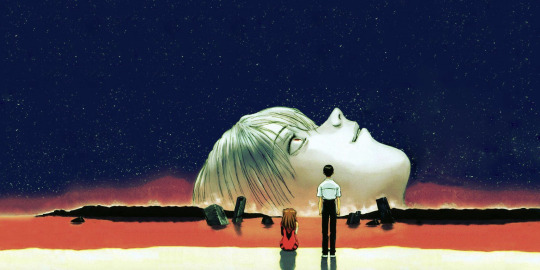
The End of Evangelion
The ambiguous ending and the portrayal of both Shinji and Asuka being shown to be alive and the world has been reborn into a new state of existence leaves many questions unanswered about the indicated trajectory of the anime. I personally found it ironic how Shinji — always conflicted, self deprecated, and hateful towards his own existence — justified his self imposed misery by not wanting to cause harm, and choosing to refuse to act at all rather than to take some form of action as a means of excusing himself from some possible blame. This feeling of his and his desire to not be alone, and perhaps even be loved, and no longer feel pain — when achieved — becomes meaningless. Insignificant. In the end, all of the self harm he imposed upon himself ended up being nothing more than his own willingness to commit, to choose to cause harm to himself. Harm to himself in the name of not causing others harm, of not being loved, all things that when he achieved no longer mattered. I find the depicted view on mental health, depression, and self deprecation that Shinji goes through and portrays resemblant to what many people go through in real life. However, my view on such an attitude stands. It's more of a choice. A choice that is reinforced through consistent habit and unwillingness to take action. As said by Misato Katsuragi before her goodbye kiss, she also experienced similar feelings, but through action, she grew. Choosing to not take action is choosing to stay in such a deprecative state. A state that we lock ourselves into with negative beliefs stemmed from fear of growth and action. Where such negative beliefs, Shinji Ikari came to understand, are inconsequential.
1 note
·
View note
Text
The father's development is quite interesting. Makes me think of why was the father so cold and distant beforehand. Is the father truly only interested in his son's usefulness?
3/26/23: Anno – Neon Genesis Evangelion (ep. 1,2,4,5)
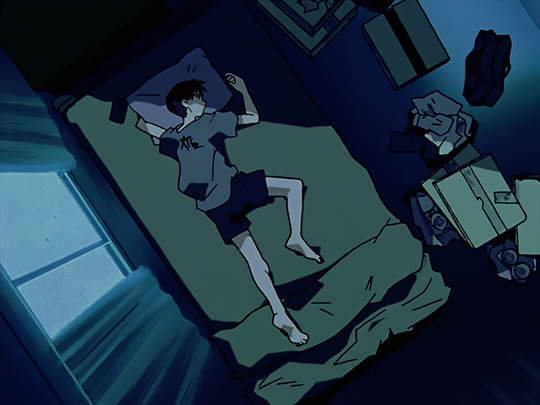
Being that this is my uncle’s favorite anime show, I had pretty high expectations coming into watching Neon Genesis Evangelion. So far, I’m pretty impressed with it and was surprised at how dark the show is. Initially, my background knowledge of the show consisted of just the ‘aesthetic’ commonly used in lofi/sad content nowadays and the popular character appearances widely used in everything. Now, I’m pretty intrigued to keep watching and see this show progress.
Right off the bat, I notice a big disconnect between Shinji and his father. Shinji seems to be in disagreement with his father and resents him for his actions, while at the same time his father seems to pay no attention to him at all while strictly treating him. Episode 5 showcases how he rather acts as a father figure for Rei, going as far as to damage his hands to save Rei which contrasts with his disappointment in Shinji’s first angel encounter. Because of this, Misato seems to step up as the parental figure for Shinji, taking him in and worrying about his state many times throughout the show. In addition to parental roles, there’s a pretty interesting development regarding Shinji in the first few episodes. He starts out as a self-deprecating coward who feels that he is not suited for the role of piloting the evangelions. He does his first mission out of spite for his father and believing that he mustn't run away, but continually puts himself down in the process. It is until he acknowledges the efforts he has made and the people that care about him, is when he finally seems to be able to accept his position and come back to Misato after running away. Though these are my first initial thoughts of what’s going on, I’m pretty interested in seeing how much this changes after hearing from several people how messed up this show gets later on.
4 notes
·
View notes
Text
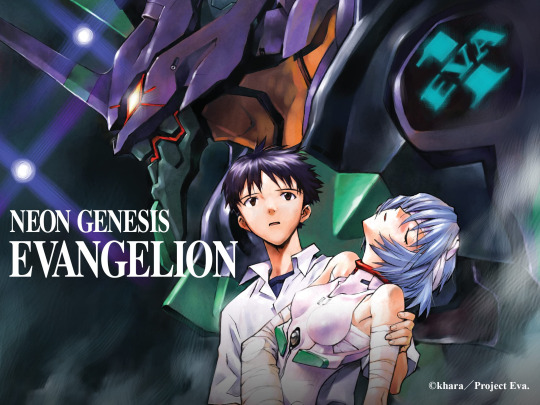
Eps 1, 2, 4, 5
Neon Genesis Evangelion is a popular anime series that has gained a large following since its debut in the mid-1990s. It's setting of a seemingly high tech society plagued by the threat of “Angels,” apocalyptic monsters immune to most weaponry except for the enormous robots that served as the only line of defense. In the first episode, we are introduced to Shinji Ikari, the protagonist of the show, who is called upon to pilot a giant bio-machine known as an "Evangelion." Shinji is initially reluctant to accept this responsibility, as he has little desire to fight and is struggling with issues of self-worth. However, seeing the struggles of a girl pilot she just met, and the chaos occurring around him as a result of the Angel attack, the responsibility felt about the situation led him to choose to pilot the giant robot against his initial intent. These events convey the theme of duty, and in this case, Shinji’s duty to protect mankind.
This emphasis on duty seems to clash with common societal gender norms. Although Sinji gets criticized for crying — because he is a boy and boys are not supposed to cry — a common societal expectation, the show features women contributing in commanding positions along with fighting in the front lines. A deviation from the stereotypical perception of women taking supporting roles, particularly in health and away from command and the stage of confrontation.
This show offers a pretty corporate view in the structure of the secret organization. A dehumanization of sorts takes place as a result of viewing people for the sole purpose of their usefulness. His father —- the big boss —- reasoning to why he brought back his son was: “because youre now useful”. Similarly, his view on the girl was to use her as much as possible for her purpose while she is alive. Such focus solely on the output over the people well being in this anime can be a parallel to real-life corporate focus on profitability over employee wellbeing.
0 notes
Text
Now I understand. I didn't catch the reason why Hato even cross-dressed in the first place. Now that you said it I remembered a reference in that he said that he cross-dresses in the club so that he can more comfortably partake in the consumption of boy love. It completely slipped my mind in the moment and I ended the series very confused on this regard.

Genshiken Second Season (ep. 1,3,4,10)
The last bit of this show actually got me interested in it. The updated animation, the introduction of new characters, and more upbeat plots per episode made me find a lot more overall enjoyment in the show and had me chuckling a bit throughout the anime. I think the second season did a good job exploring what it truly means to be an otaku while also exploring the fears and struggles of knowing yourself, your interests and your sexuality.
The idea of being a true otaku is displayed in this season. To be an otaku means to evolve and avidly partake in the media you consume. It’s not enough to simply watch an anime or read manga, but avidly become one with it. This is possible through activities such as cosplaying and writing fanfiction/doujinshi. These activities involve you actively partaking in the fandom you like to attain the fictional desires most otakus have. You grow the media and it changes based on its fan base too. The attributes of certain anime and manga are added to a theoretical database that fans can access and use in their own writings and outfits. This season, we see lots of both cosplay and writing. Chika has embraced her inner otaku and began creating her own original works that draw upon stuff she has seen or read. She has become an active participant in the world of fiction that anime fans love to interact with, which may itself become part of the database as well. The rest of the cast such as Sue, Oone, and Rika express themselves through cosplay to live out and become their fantasies. There is even a scene where Oone mentions how cosplay has to be perfect in order to truly live up to the source material, including wearing (or not wearing) the same type of underwear and having the same tone of voice.
The idea of coming to terms with your person and interests are talked about in this season. Characters who were ashamed of their interests and kinks such as Chika have come to terms with who they are. They no longer need to ridicule others or hide their true colors to be comfortable in their own skin. She has accepted herself as an otaku and removed the stereotypes attached to that label from herself. However, Hato is a special case in this topic. Hato is someone who likes to cross dress as a girl and likes to be seen as a girl while in club in order to show his true interest in fujoshi. Outside of the club, he dresses like a boy and hides his true interests, afraid of being called out for liking guys (which he himself is also conflicted about). Through the episodes we watch, we see Hato break out of his shell and talk about his interests in his guy persona with Maderame, whom he has a somewhat complicated interest in. He is able to show the others in the club both sides of himself and finally learns to feel comfortable saying how he enjoys the fujoshi community. He claims his interest has nothing to do with his sexuality but he starts questioning this a bit when he remembers the level of comfort he has with Madarame. These episodes show that it’s okay to be weary of your sexuality and explore options. There is no shame in that and we as a society should see it as okay too. Furthermore, it helps further extinguish the fear people have about their interest and kinks. In moderation and within reason, there is no reason to be fearful of liking something.

3 notes
·
View notes
Text

Misushima – Genshiken Second Season (ep. 1,3,4,10)
In Genshiken Season 2, eps 1, 3, 4, 10. We are back at the Otaku’s club. Again, I couldn't help but notice some forms of discrimination towards the Otakus. The Miyazaki incident led to an Otaku scare, and social resentment towards those deemed Otaku arose throughout Japan.
Suzi being a foreigner, however, has not grown up in the Japanese culture affected by the Miyazaki incident. As such, she’s comfortable expressing her Otaku self, unlike most of the other portrayed Japan raised Otakus.
The stereotypical Otaku perversion is also an ample subject in these episodes. We can see instances in the anime where the characters have to face their sexual desires toward fictional works. Despite this being a similar subject to that of the circumstances faced in the first season, there is a greater emphasis on erotic fiction. Particularly boy love. In season two, the cast is replaced by a group of “rotten” girls — or fujoshi, is a Japanese term for female fans of manga and novels that feature romantic relationships between men. Even Kenjiro Hato had an interest in these boys love erotic works. Despite the perceived perversion associated with these otaku interests, they are not carried out. When Kenjiro and his alternate persona reflect on living out their boy love fantasies on the passed out Harunobu Madarame, they are never carried out. Toward the end, Kenjiro Hato discusses with Kaminaga some quite erotic boy love ideas, ideas that he denies real interest in for himself to partake.
Expressions of the characters Otaku’s interest is also of interest. Kanako cosplaying, Chika’s production of doujinshi, particularly boy love, And Souichirou Tanaka’s creation of cosplaying outfits are all examples of these Otakus' attempts to recreate their fictitious interests into a fiction of their own. Whether its an imitation of a fictitious character, storyline, or clothing style, These otakus are attempting to take their consumed fiction into their own non-reality.
0 notes
Text
If Hana is a representation of society is the children growing up a representation of how to raise individuals? Having them capable of choosing their own paths, and raised through the efforts of Hana despite her feeling like she has not done enough for them.

Wolf Children
Wolf Children is a very heartwarming story about the coming of age of two extraordinary children born with wolf genes. The story follows a college student turned mother named Hana who falls in love with a werewolf who has kept his true identity a secret until meeting her. Despite this, she loves him just as much and starts a family with him. After baring two children named Yuki and Ame, the dad (named Ookami which means wolf funnily enough) passes away leaving Hana alone to raise two werewolf children. This show tackles several deep themes by having all endeavors and characters each represent a different critique on life.
Hana herself is a selfless mother. She loves her children with her entire heart despite them being different from her. She quits her jobs and school in order to work five times as hard to live out her life with her children in a safe and distant location, free of wandering eyes and discrimination. To me, Hana represents the ideal society. She is how we would like the general public to behave and treat others. In our world, people look at those different from them with discriminatory glances, bad mouths, and generally unfair behavior. Instead of accepting people with differences (either genetic or behavioral), most different individuals are seen and treated as outcasts. This is hinted by the strange looks all the pedestrians and locals give Hana when they suspect and see Yuki and Ame acting animalistic. However, Hana is the opposite. She sees them all as equal and deserving of love and appreciation. She takes them away from the city and busts her rear doing manual labor to provide for them to avoid that discrimination plaguing our world. Souhei can also be seen as an ideal mindset. Despite knowing of Yuki’s true self, he still avidly pursued a friendship with her and never made a big deal of her wolf self.
Yuki and Ame are foils for each other. Yuki is more of a conformist, prefers her human side, and is loud and vocal while Ame is a lone wolf (literally) who chooses his own path in life, prefers his animalistic side, and is quiet and reserved. Yuki’s argument with Ame shows the two opposing forces. Yuki is very much affected by what others say of her. She wants to fit in and be a regular girl just like her peers. That’s why she wanted to go to school so much and not smell of animals like the children would accuse her of. Her normal was following what was laid out as the status quo. She chose her human side to live out the “normal” she hears about. Ame on the other hand is a non conformist. He opposes Yuki’s ideology and after their argument, their lives take different paths. Ame stops going to school because he sees no value in it. Though “normal” kids go to classes, he doesn’t care about being “normal” and chooses to learn practically from nature. He embraces his wolf side and runs away to live out a life that he chooses, not one labeled by society as the correct path.
At the end of the movie, Hana has both of her children leave to follow their own paths in life (Ame in the forest as a wolf and Yuki in school pursuing a higher education). Despite all this, she is happy because she feels she has lived a happy life and was able to raise two children she is proud of. Her actions resemble the ideal mother who is proud of her children, regardless of the paths they take in life.
Overall, I loved this movie and would recommend everyone who hasn’t seen it to take a dive into it. It’s fun, charming, and filled with passion. The animation is crisp and clean and the soundtrack adds to the emotional impact. This is a bonafide Javius recommendation.

3 notes
·
View notes
Text
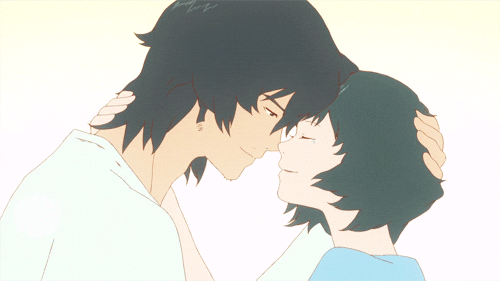
Wolf Children
Parenthood is a big subject in the movie, with the establishment of the family unit with the childrens well being at the center, and the parents happily raising and providing for the children. Much of what one would expect of a conceptually ideal family. However, the ideality of the situation takes a hit with the death of the father. The mother's struggles show the extent of motherly love towards her children, and the sacrifices she had to make for her well being, along with rough choices as she prioritized her children's future. Despite all of her continuous sacrifices and labor as she tried to feed her family on this new and initially risky ambient. Nevertheless, the family begins settling in, and with the help of the community as a whole, a community represented as better established in this rural, kind of counter cultural environment. Perhaps a critique of modern urban communities?
As the children grew and begin to choose their own path how should the parents interact. What should they guide them towards? And is it something they can even do?
3 notes
·
View notes
Text
Even before the thought of the attainability of peace, I find the term too loosely ended. The anime didn't really give a definition for their peace. So what would peace in the Shinobi world even look like?
Naruto (ep. 1), Naruto Shippūden (eps. 162, 163, 168, 174, 175)
Not gonna lie, the Naruto series has always been my favorite! And the only long anime that I have ever watched. It sucks that those who haven’t been able to finish Naruto Shippuden before this class had now received spoilers. The pain arc has the most impact on the leaf village. From the first episode, you see that Naruto, an innocent young child, has the center of hatred from the villagers. This was a very painful experience that Naruto had to grow in but his reaction to pain and hatred is what makes him different from Nagato.
Nagato tells Lady Tsunade that pain is necessary to find true peace and that he will the pain by destroying the villages. He states that people use war as an excuse of killing others for the purpose of seeking peace. However, all that brought was pain and hatred! That this cycle of hatred will continue to bring violence and peace will be impossible to achieve. His plan to bring peace is by infusing all jinchurikis to make one single powerful jinchurki that will bring “Pain” (which is killing a lot of people) for temporary peace until villages continue the cycle of hatred.
Ironically, young Nagato's hope of finding a way to find peace had influenced Jiraiya’s book that the fourth hokage named Naruto. However, the pain brought by war destroyed that hope of finding peace and twisted the definition of peace because he was consumed by that hatred. When Naruto found Nagato he decided that he decide not to kill Nagato for revenge because he believe he will believe that he can find peace another way. Nagato saw that Naruto had not let pain and hatred change his hope of peace and decide to rely on him to find peace like their master, Jiraiya.
From day one, Naruto has always been a target of hatred and he didn’t let him be consumed by hatred or lose hope. He could’ve easily turned his back on the leaf village when the sand village attaches during in chunin exam but he made it his responsibility to stop the other Jinchuriki from saving the village. He had hoped that he was able to grow and change the heart of the villagers which made them recognize him as part of the village and not the nine-tail fox that once attack their village. Naruto’s will, hope, and action slowly made the leaf villagers hope to view him as a monster but as a hero to the village. Naruto found it shocking that villagers rally for his arrival with hope and love and not with hatred because they used to throw rocks and insults at him as a group. It was nice that the adults who supported him acknowledged that Naruto suffered so much for this recognition and was crying for him!
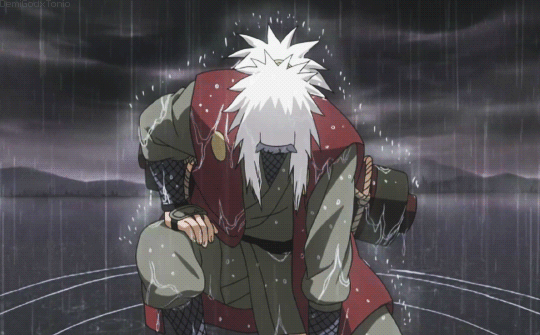
3 notes
·
View notes